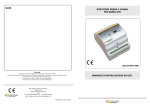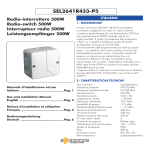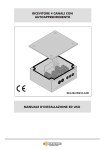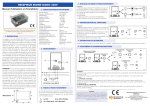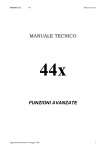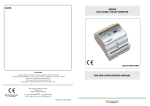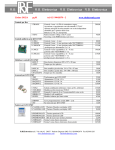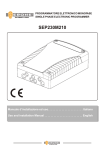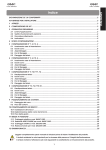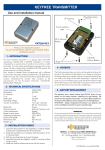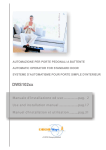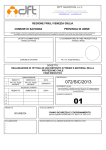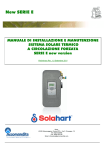Download istruzioni 4ch potenza it-uk.cdr
Transcript
Ricevitore di potenza 4 relè 4 Relais power receiver SEL2641R433-C4V, SEL39R433-C4V, SEL39R30-C4V, SEL39R27-C4V, SEL2641R433-C4P SEL39R433-C4P SEL39R30-C4P SEL39R27-C4P Manuale d’installazione ed uso - Italiano .....................Pag. 4 Use and installation Manual - English .......................Pag. 11 1 THE SMART LIVING Misure di sicurezza Per un perfetto funzionamento dell’apparecchio, si prega di leggere interamente questo manuale e seguire attentamente le indicazioni ivi descritte, in quanto l’uso improprio può danneggiare l’apparecchio ? Security measures For a perfect functioning of the device, read carefully this manual and follow all the indications, since an inadeguate use can make damages to the device Dichiarazione di Conformità: Il costruttore Elpro Innotek Spa dichiara che il radioprogrammatore mod. SEL2641R433-P4, SEL39R433P4, SEL39R30-P4 è conforme alle Direttive Europee 73/23/CEE, 89/336/CEE e 99/05/CE. ? Declaration of Conformity: Elpro Innotek Spa as manufacturer declares that the following appliances : SEL2641R433-P4, SEL39R433-P4, SEL39R30-P4 fullfil the requirements of the European Directives 73/23/CEE, 89/336/CEE and 99/05/CE. Presentazione / Introduction Coperchio Cover 4 viti per fissaggio del coperchio 4 screws for cover fixing 4 Viti per fissaggio della scatola 4 screws for box fixing Passacavi Wire leads 4 tasselli 4 plugs Antenna Aerial Scatola con ricevitore e coperchio di protezione in plexiglass Receiver box with plexiglas cover Fig. 1 2 THE SMART LIVING Interassi / Drilling distances Dimensioni d’ingombro / Overall dimensions 52 104 140 115 Fig. 2 128 Fig. 3 Layout Jumper Passo-Passo Jumper for Step mode Tasto P1 Push-button P1 Scheda radio RF RF Radio card Ingresso antenna Antenna terminal board Trasformatore di alimentazione Transformer ON 18 19 F1 Fusibile F1 : 3,15A - 250V Fuse F1 : 3,15A - 250V Led di attivazione relè Relais activation LED 230V 1 2 L N 6 7 8 9 10 11 12 Ch1 Ch2 13 14 15 16 17 Ch3 Ch4 Morsetti di alimentazione Power Supply Terminal boards Morsettiere di I/O I/O Terminal boards Morsetti di terra GROUND Terminal boards Fig. 4 3 THE SMART LIVING ITALIANO 1 - DESCRIZIONE Il ricevitore di potenza 4 relé è un ricevitore supereterodina con 4 uscite a contatti puri. E’ stato concepito per comandare automatismi di chiusura e sistemi d’allarme con potenza massima di commutazione dei contatti di 3,5 KW. La frequenza e le tecnologie impiegate lo rendono conforme alle regolamentazioni europee in termini di radiofrequenza e di compatibilità elettromagnetica (CE). A seconda del modello ( ved. tabella ) cambia il tipo di codifica di sicurezza, che può essere rolling code ( Keeloq ® ) per i modelli della serie “2641” oppure a codice fisso per i modelli della seie “39”. I contatti di uscita dei 4 relè possono essere NA ( per i relè 1 e 3 ) e NA/NC per i relè 2 e 4. La potenza massima commutabile dai relè è di 3,5 KW a 230 Vac La memorizzazione dei trasmettitori si effettua sia mediante i tasti del ricevitore per autoapprendimento. I codici dei trasmettitori sono memorizzati in EEPROM. La frequenza di ricezione e la codifica variano a seconda del modello. La seguente tabella riassume i sequenziali della gamma Erone evidenziandone serie, modello, frequenza e tipo di codifica: Il ricevitore viene prodotto in 8 modelli che differiscono per tensione di alimentazione, codifica di sicurezza e frequenza: Modello RX Alimentazione Codifica Frequenza SEL 2641 R433 C4P SEL 2641 R433 C4V 12 / 24 Vac-dc 230 Vac Rolling code Rolling code 433,92 MHz 433,92 MHz SEL 39 R433 C4P SEL 39 R433 C4V 12 / 24 Vac-dc 230 Vac 3Exp9 3Exp9 433,92 MHz 433,92 MHz SEL 39 R27 C4P SEL 39 R27 C4V 12 / 24 Vac-dc 230 Vac 3Exp9 3Exp9 27,195 MHz 27,195 MHz SEL 39 30 C4P SEL 39 R30 C4V 12 / 24 Vac-dc 230 Vac 3Exp9 3Exp9 30,875 MHz 30,875 MHz Caratteristiche comuni Alim. 230Vac Alim. 12/24 Vac-dc Tipo ricevitore Modulazione Impedenza d'ingresso Emissione dell'oscillatore locale Tensione di alimentazione Consumo max Supereterodina AM/ASK 50 Ohm < -57 dBm 230 Vac 28 mA Supereterodina AM/ASK 50 Ohm < -57 dBm 12 - 24 Vac-dc 200 mA @24 Vac 260 mA @12 Vac Potenza massima applicabile ai contatti dei relè Temperatura di funzionamento Grado di protezione Dimensioni (mm ) Peso Memorizzazione TX 3,5 KW / 230 Vac -20°/+70°C IP44 140 x 115 x 52 420 gr autoapprendimento 3,5 KW / 230 Vac -20°/+70°C IP44 140 x 115 x 52 310 gr autoapprendimento Tab.1 4 THE SMART LIVING Caratteristiche radio specifiche Frequenza portante (MHz) Frequenza dell’oscillatore locale Frequenza intermedia Larghezza di canale Sensibilità d’ingresso N° max di utenti memorizzabili SEL2641R433 433.92 6.6128 10,7 MHz > 25 KHz -117 dBm 85 SEL39R433 433,92 6.6128 10,7 MHz > 25 KHz -117 dBm 100 SEL39R30 SEL39R27 30,875 30,420 455 KHz 12,5 KHz -113 dBm 100 27.195 27.650 455 KHz 12,5 KHz -113 dBm 100 Tab.2 4 - FUNZIONALITA' - 85 / 100 tasti trasmettitore memorizzabili - Autoapprendimento e cancellazione del codice del trasmettitore per mezzo di un solo tasto presente sul ricevitore - Visualizzazione N° totale utenti memorizzati - Sovrascrittura codice di Tx già presente in memoria - Cancellazione completa della memoria sia da radiocomando - Funzionamento programmabile del 4° relè : monostabile o bistabile 5 - INSTALLAZIONE L’apparecchiatura è costruita in conformità con quanto previsto dalle Direttive Europee 89/336/CEE, 73/23/CEE nonché da quanto indicato nella Norma EN 60335-1. 5.1 - Posizionamento La scelta della posizione del ricevitore è molto importante per ottenere un buon funzionamento del sistema. Devono essere rispettate le seguenti condizioni: - posizionare il ricevitore lontano da fonti di disturbo quali sistemi informatici, allarmi od altre emissioni radio. - la distanza tra due ricevitori deve essere superiore a 1.5 metri. 5.2 - Fissaggio Togliere il coperchio dal ricevitore. Fissare la scatola ad ogni angolo utilizzando viti e tasselli in dotazione o con viti appropriate alla natura del supporto. 5 THE SMART LIVING 5.3 - Connessioni 2 - Collegare i contatti di uscita dei relè ai morsetti corrispondenti (fig. 6): Le connessioni sono differenti a seconda del modello. 1A- Collegare l'alimentazione 230 Vac ai morsetti corrispondenti (fig. 4): morsetto 1 = L linea morsetto 2 = N neutro morsetti 6 e 7 = PE Terra morsetto 13 = C relè 3 (R3) morsetto 14 = NA relè 3 (R3) morsetto 15 = C relè 4 (R4) morsetto 16 = NA relè 4 (R4) morsetto 17 = NC relè 4 (R4)) ATTENZIONE : Collegare l’apparecchio all’impianto elettrico dell’edificio mediante un interruttore magnetotermico con apertura dei contatti di Almeno 3 mm. ! 1 L 2 N 6 morsetto 8 = C relè 1 (R1) morsetto 9 = NA relè 1 (R1) morsetto 10 = C relè 2 (R2) morsetto 11 = NA relè 2 (R2) morsetto 12 = NC relè 2 (R2 7 Fig.5 8 9 10 11 12 C NA C NA NC Relè 1 Relè 2 13 14 15 16 17 C NA C NA NC Relè 3 Relè 4 Fig. 7 1B - Collegare l’alimentazione 12 o 24 Vac/dc ai morsetti 3, 4, 5. (fig. 5): morsetto 3 = + 24 Vac/dc morsetto 4 = + 12 Vac/dc morsetto 5 = 0 3 4 5 24 12 0 3 -Collegare l’antenna come segue (fig. 7): - se collegate un'antenna (non in dotazione), collegare la calza al morsetto 18, ed il centrale al morsetto 19; oppure collegare il filo d'antenna in dotazione al morsetto 18. 6 7 18 19 Antenna +ACFig. 6 Fig. 8 5.4 - Fusibile Il Fusibile F1,montato solo nei modelli con alimentazione a 230 Vac, ha la funzione di proteggere la scheda elettronica. 6 THE SMART LIVING 6 - MEMORIZZAZIONE DEI TRASMETTITORI La memorizzazione dei trasmettitori si effettua in modo sequenziale facendo uso del solo pulsante P1 presente sulla scheda. La conferma delle operazioni viene indicata dai led DL1, DL2, DL3, DL4 posti i corrispondenza dei 4 relè. Modulo Rf La memorizzazione prevede di effettuare delle pressioni successive del tasto P1. L’accensione dei led LD1, LD2, LD3, LD4 è ciclica: ad ogni pressione di P1 si accende un led e si spegne il led precedente. (fig. 10) Il led DL4 si accende stabilmente oppure lampeggia a seconda della configurazione del jumper J1 ( ved. cap. 8 ) Ingresso antenna ON Trasformatore 18 19 Fusibile LED3 LED4 LED1 LED2 F1 230V 1 2 L N 6 7 8 9 10 11 12 13 14 15 16 17 Ch2 Ch1 Ch4 Ch3 Fig. 9 LD1 LD2 LD3 LD4 Fig. 10 6.1 Memorizzazione di un Trasmettitore a 2 canali La memorizzazione prevede di effettuare delle pressioni successive del tasto P1. Esempio 1: Memorizzazione di un radiocomando bicanale con il tasto A che attiva il relè 1 ed il tasto B che attiva il relè 2 LD1 si spegne LD1 si accende Tenere premuto P1 per 2 sec fino a quando LD1 si accende Rilasciare P1 Premere il tasto A del trasmettitore da memorizzare LD2 si accende Premere P1 LD2 si spegne Rilasciare P1 Premere il tasto B del trasmettitore da memorizzare Fig. 11 7 THE SMART LIVING 6.2 Memorizzazione di un Trasmettitore a 4 canali La memorizzazione prevede di effettuare delle pressioni successive del tasto P1. Esempio 2: Memorizzazione di un radiocomando quadricanale con le seguenti associazioni: Tasto A Tasto B Tasto C Tasto D LD1 si spegne LD1 si accende Tenere premuto P1 per 2 sec fino a quando LD1 si accende LD2 si accende Premere il tasto A del trasmettitore da memorizzare Rilasciare P1 Rilasciare P1 Premere il tasto C del trasmettitore da memorizzare LD2 si spegne Premere il tasto B del trasmettitore da memorizzare Rilasciare P1 Premere P1 LD3 si spegne LD3 si accende Premere P1 Relé 1 Relé 2 Relé 3 Relé 4 LD4 si accende LD4 si spegne Rilasciare P1 Premere P1 Premere il tasto D del trasmettitore da memorizzare Fig. 12 7 - CANCELLAZIONE DEI TRASMETTITORI 7.1 Cancellazione di un Trasmettitore Premere e tenere premuto il pulsante P1per 2 sec. fino a quando si accende il led relativo al relè associato al tasto del trasmettitore da cancellare. Premere successivamente il tasto del trasmettitore da cancellare ( es. tasto A): il ricevitore dà conferma dell’avvenuta cancellazione spegnendo il led LD1 e con 2 lampeggi contemporanei dei 2 led LD3 ( Rosso) ed LD4 (Verde ). Esempio 3 : Cancellazione del tasto A del trasmettitore dal relè 1 LD1 si accende LD1 si spegne LD3 ed LD4 lampeggiano 2 volte contemporaneamente Tenere premuto P1 per 2 sec fino a quando LD1 si accende Rilasciare P1 Premere il tasto ( es. A) del trasmettitore da cancellare 8 THE SMART LIVING Fig. 13 7.2 Cancellazione completa della memoria Premere e tenere premuto il pulsante P1per 2 sec. fino a quando si accende il led LD1. Rilasciare e ripremere P1 successivamente fino a quando LD3 ed LD4 lampeggiano contemporaneamente 3 volte. ! Al termine della procedura tutti i dati presenti in memoria vengono cancellati LD1 si spegne LD1 si accende LD3 ed LD4 lampeggiano 3 volte contemporaneamente Tenere premuto P1 per 2 sec fino a quando LD1 si accende Rilasciare P1 Ripremere P1 fino a quando LD1 si spegne Fig. 14 8 - FUNZIONAMENTO PASSO-PASSO RL4 Il relè K4 è configurabile in funzionamento impulsivo o passo-passo a seconda della posizione del jumper J1. In configurazione passo-passo il led Verde LD4 quando attivato durante le fasi di memorizzazione e cancellazione invece di accendersi stabilmente, lampeggia. J1 Aperto : IMPULSIVO LD4 : Luce continua J1 Chiuso : PASSO-PASSO LD4 : Lampeggia Fig. 15 9 - VISUALIZZAZIONE SPAZIO DI MEMORIA Attraverso la seguente procedura è possibile risalire al numero di tasti trasmettitore presenti in memoria. La visualizzazione avviene per mezzo dei led LD3 ( Rosso) ed LD4 ( Verde). Premere P1 e verificare l’accensione del led LD1. Mantenere premuto P1. Non appena il led LD1 si spegne rilasciare il tasto P1. A questo punto inizia una sequenza di accensioni dei led LD3 (LR) ed LD4 (LV). La sequenza esprime in notazione binaria il numero di tasti trasmettitore memorizzati. Annotando la sequenza è possibile risalire a questo numero in base alla tabella seguente: Led acceso Peso colore verde Peso colore rosso 1° 1 0 2° 2 0 3° 4 0 4° 8 0 5° 16 0 6° 32 0 7° 64 0 Tab.3 Esempio 4: Sequenza di accensione led : LR, LR, LV, LV, LR, LR, LR. Il numero ottenuto sarà: 0 + 0 + 4 + 8 + 0 + 0 + 0 = 12 Perciò in memoria sono presenti 12 tasti trasmettitori. 9 THE SMART LIVING ENGLISH 1 - DESCRIPTION The power receiver is a superheterodyne receiver with 4 power outputs. It has been designed for the control of automatic closing systems and anti-burglar systems with maximum power on the relay contacts of 3,5 KW. The decoding system can be different depending upon the model ( Series “2641” with rolling code Keeloq and Series “39” with fixed code system. The receiver has 2 output relays, with NO ( Normally open ) contacts and 2 relays with NO/NC ( Normally open and normally closed) contacts. It can be connected to any type of appliance as gates, garage doors, rolling shutters, lighting, etc.) The max power commutable is 3,5 KW @ 230 Vac for each relay. The user codes can be memorised both with the receiver buttons and, via radio, in self-learning, using the transmitter keys. The receiver is produced in 8 different versions with different power supply, frequency and decoding system: RX Type Power supply Security system Frequency SEL 2641 R433 C4P SEL 2641 R433 C4V 12 / 24 Vac-dc 230 Vac Rolling code Rolling code 433,92 MHz 433,92 MHz SEL 39 R433 C4P SEL 39 R433 C4V 12 / 24 Vac-dc 230 Vac 3Exp9 3Exp9 433,92 MHz 433,92 MHz SEL 39 R27 C4P SEL 39 R27 C4V 12 / 24 Vac-dc 230 Vac 3Exp9 3Exp9 27,195 MHz 27,195 MHz SEL 39 30 C4P SEL 39 R30 C4V 12 / 24 Vac-dc 230 Vac 3Exp9 3Exp9 30,875 MHz 30,875 Mhz Common specifications Supply 230Vac Supply 12/24 Vac-dc Receiver type Modulation Input load Local oscillator emissions Supply voltage Current consumption (max ) Superheterodyne AM/ASK 50 Ohm < -57 dBm 230 Vac 28 mA Max relays contact power Operating temperature IP grade protection Dimensions (mm ) Weight Transmitters Memorization 3,5 KW / 230 Vac -20°/+70°C IP44 140 x 115 x 52 420 gr selflearning Superheterodyne AM/ASK 50 Ohm < -57 dBm 12 - 24 Vac-dc 200 mA @24 Vac 260 mA @12 Vac 3,5 KW / 230 Vac -20°/+70°C IP44 140 x 115 x 52 310 gr selflearning Tab.1 10 THE SMART LIVING Single radio specifications Carrier frequency (MHz) Local oscillator frequency Intermediate frequency Channel width Input sensitivity User code number SEL2641R433 SEL39R433 433.92 6.6128 10,7 MHz > 25 KHz -117 dBm 85 433,92 6.6128 10,7 MHz > 25 KHz -117 dBm 100 SEL39R30 30,875 30,420 455 KHz 12,5 KHz -113 dBm 100 SEL39R27 27.195 27.650 455 KHz 12,5 KHz -113 dBm 100 Tab.2 4 - MAIN FEATURES - 85 / 100 transmitter keys memory - Self-learning and cancellation of transmitter code with 1 push-button - Display of the number of the stored transmitters - Cancellation either of the single transmitter or of the full memory - Programmable operating mode for the fourth relay RL4 : pulse or step. 5 - INSTALLATION The appliance has been manufactured in compliance with the European Directives 89/336/CEE, 73/23/CEE, 99/5/CE and with the Regulation EN 60335-1. 5.1 - Positioning The location choice is very important for the best result of the installation. The following conditions have to be followed: - Fix the receiver far from interference sources as informatic systems, allarm systems or other radio emissions. - the distance between 2 receivers should be more than 1.5 m. 5.2 - Fixing Remove the cover of the receiver; fix the box in each corner by using the screws and the plugs supplied.. 11 THE SMART LIVING 5.3 - Connections The connections are different upon the model. 2 - Connect the output relays contacts to the corresponding terminals ( Fig. 6): 1A- Connect the Mains 230 Vac to the corresponding terminal boards (fig. 4): terminal 1 = L Line terminal 2 = N neutre terminals 6 and 7 = PE Gnd ATTENTION : terminal 13 = C relay 3 (R3) terminal 14 = NO relay 3 (R3) terminal 15 = C relay 4 (R4) terminal 16 = NO relay 4 (R4) terminal 17 = NC relay 4 (R4)) Connect the appliance to the electric plant of the building through a magnetothermic switch with contact distance of at least 3 mm. ! terminal 8 = C relay 1 (R1) terminal 9 = NO relay 1 (R1) terminal 10 = C relay 2 (R2) terminal 11 = NO relay 2 (R2) terminal 12 = NC relay 2 (R2) 8 9 10 11 12 C NO C NO NC Relay 1 Relay 2 1 L 2 N 6 13 14 15 16 17 C NO C NO NC Relay 3 Relay 4 7 Fig. 7 Fig.5 3 -Connect the antenna as follows (fig. 7): 1B - Connect the supply at 12 or 24 Vac/dc to the terminal boards 3, 4, 5. (fig. 5): terminal 3 = + 24 Vac/dc terminal 4 = + 12 Vac/dc terminal 5 = 0 if you want to use an antenna,( not supplied), connect the shield to the terminal 18 and the net to the terminal 19, otherwise if you use the antenna cable supplied, connect it to the terminal 19. 18 19 3 4 5 24 12 0 6 7 Antenna Fig. 8 +ACFig. 6 5.4 - Fuse The fuse F1 is only present on the receivers supplied at 230 Vac. The fuse F1 of 315 mA needs for the electronic card protection. 12 THE SMART LIVING 6 - TRANSMITTER MEMORIZATION The transmitter memorization is carried out sequentially using the push-button P1. The system gives the operation confirmation with the led DL1, DL2, DL3, DL4 located above the corresponding relay. Module Rf The lighting of the leds LD1, LD2, LD3, LD4 is cyclic: at every pressure of P1 a led is turned on and the preceding led is turned off. (Fig. 10 ) The led DL4 is turned on continously or flashes according to the configuration of the jumper J1 (see. cap. 8 ) Antenna P1 Transformer ON 18 19 Fuse LED1 LED2 LED3 LED4 F1 230V 1 2 L N 6 7 8 9 Ch1 10 11 12 13 14 15 16 17 Ch2 Ch4 Ch3 Fig. 9 LD1 LD2 LD4 LD3 Fig. 10 6.1 2 channel transmitter memorization The procedure is effected with some pressures of the push-button P1. Example 1: Memorization of a 2 channel transmitter with the key A that activates the relay 1 and the key B that activates the relay 2. LD1 turns off LD1 turns on Keep P1 pressed down for 2 sec. until LD1 comes on Release P1 Press the transmitter key A to memorize LD2 turns on Push P1 LD2 turns off Release P1 Press the transmitter key B to memorize Fig. 11 13 THE SMART LIVING 6.1 2 channel transmitter memorization The procedure is effected with some pressures of the push-button P1. Example 1: Memorization of a 2 channel transmitter with the key A that activates the relay 1 and the key B that activates the relay 2. KEY1 KEY2 KEY3 KEY4 LD1 turns off LD1 turns on Keep P1 pressed down for 2 sec. until LD1 comes on Release P1 Press the transmitter key A to memorize LD2 turns on Press the transmitter key C to memorize Release P1 LD2 turns off Release P1 Push P1 LD3 turns off LD3 turns on Push P1 Relay1 Relay2 Relay3 Relay4 Press the transmitter key B to memorize LD4 turns on LD4 turns off Release P1 Push P1 Press the transmitter key D to memorize Fig. 12 7 - TRANSMITTERS CODE CANCELLING PROCEDURE 7.1 Single transmitter cancelling Keep P1 pressed down for 2 sec. until the led corresponding to the relay associated to the key remains lit. Next push the transmitter key to cancel ( example Key A ) : the receiver gives the confirmation by turning off the led and with 2 flashes of both the led LD3 ( Red) and LD4 (Green ). Example 3 : Cancellation of the transmitter key A from the relay 1. LD1 turns on LD1 turns off LD3 and LD4 blink twice simultaneously Keep P1 pressed down for 2 sec. until LD1 comes on Release P1 Press the transmitter key A to cancel ( ex A) Fig. 13 14 THE SMART LIVING 7.2 Full memory cancelling Keep P1 pressed down for 2 sec. until LD1 comes on. Release and within 2 sec. keep P1 pressed down until LD3 and LD4 blink 3 times simultaneously. ! At the end of the procedure all memory data will be cancelled. LD1 turns off LD1 turns on LD3 and LD4 blink 3 times simultaneously Release P1 Keep P1 pressed down again until LD1 turns off Fig. 14 8 - RELAY RL4 STEP OPERATING MODE RL4 can operate in step-mode according to the position of jumper J1 ( see figure 2 below ). In step mode, during the memorization and cancellation phases, LD4 blinks instead to remain lit J1 Open : PULSE-MODE LD4 : Remains Lit J1 Closed : STEP-MODE LD4 : Blinks Fig. 15 9 - MEMORY SPACE DISPLAY With this procedure it is possible to display the number of transmitter keys memorized The display is carried on with the led LD3 ( Red) and LD4 ( Green ). Push P1 and verify LD1 on. Keep P1 pressed down until LD1 switches off. Then release it at once. At this point begins a sequence of 7 total blinks of the two led lights LD3 and LD4: by taking a note of what color light blinks, it is possible to get the memory position, according to the following table: Led blink number 1 Green Blink (LV) Red Blink (LR) Total blinks 2 1 0 3 2 0 4 4 0 5 8 0 6 16 0 7 32 0 64 0 Tab.3 Example 4: Transmitter blinks the following seven times after pushing the button P1: RED - RED - GREEN - GREEN - RED - RED - RED Then one whould fill in table 1 as follows: Led blink number 1 Green Blink (LV) Red Blink (LR) Total blinks 2 1 0 0+ 3 2 0 0+ 4 4 0 4+ 5 8 0 8+ 6 16 0 0+ 7 32 0 0+ 64 0 0+ Tab.4 This corresponds to the 12th position. 15 THE SMART LIVING Note Garanzia Guarantee Guarantee period: 24 months from the productions date placed inside. In this period if the appliance has any malfunction due to a defective component,it will be repaired or replaced by the manufacturer. The warranty doesn't cover the plastic box. The assistance will be performed at the manufacturer site. THE SMART LIVING Manufactured by Elpro Innotek SpA Via Piave, 23 I-31020 S.Pietro di Feletto (TV) Italy Tel. +39-0438-450860 - Fax . +39-0438-455628 Web : www.erone.com - email: [email protected] IS-RP4ERML Rev.2 del 7/09/2004 La garanzia è di 24 mesi dalla data di fabbricazione apposta all’interno. Durante tale periodo, se l’apparecchiatura non funziona correttamente, a causa di un componente difettoso, essa verrà riparata o sostituita a discrezione del fabbricante. La garanzia non copre l’integrità del contenitore plastico. La garanzia viene prestata presso la sede del fabbricante.
















